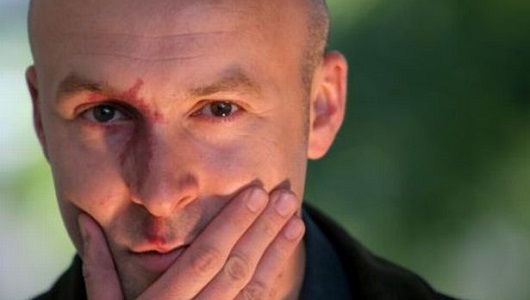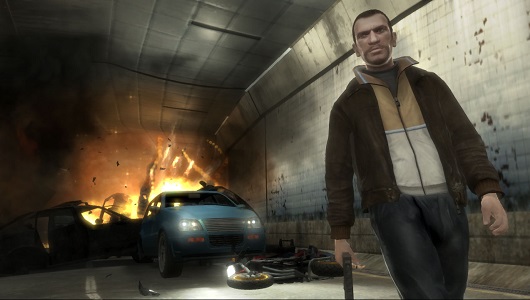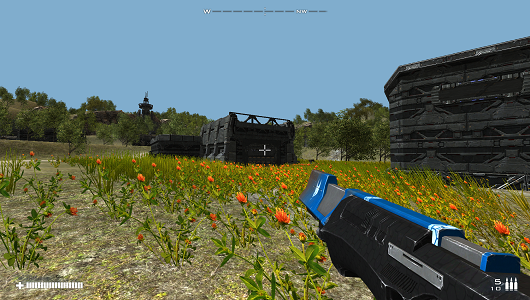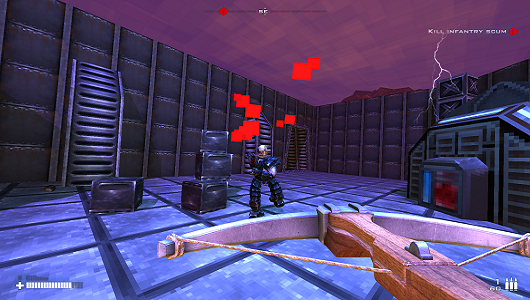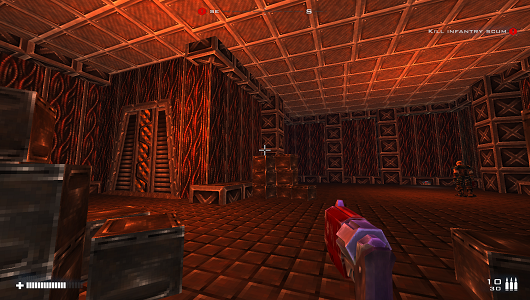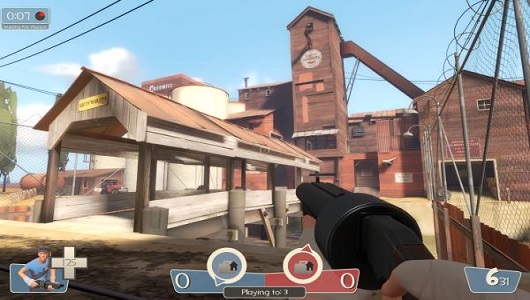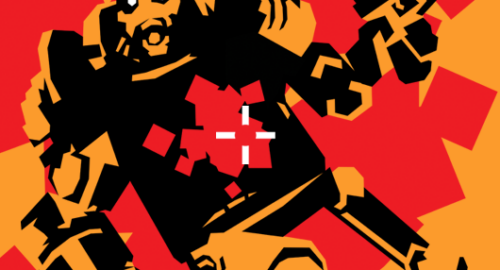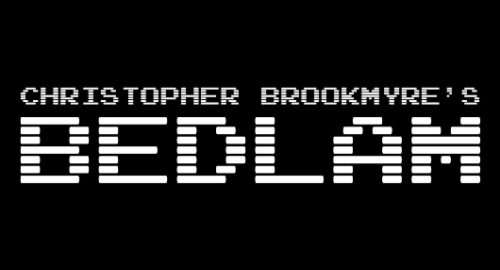At the recent BAFTA Games Showcase where I previewed Bedlam, I was also given the opportunity to interview its writer, Christopher Brookmyre. Author of the Bedlam novel too, I asked Christopher what it was like to become involved in game development, the ideas he brought to the table and what video games he played that inspired some of his work.
Enjoy
__________________________________________________________________
What is Bedlam?
Game, book or both?
Both
Game and book – they both tell the same story and explore the same concept. The idea is someone who works for a neurological scanning development company is checking out a new prototype. After stepping into the scanner, they are suddenly not at their place of work in Sterling anymore. Instead, they are on what appears to be another planet with a massive interplanetary battle going on. But it becomes apparent to the protagonist that it is not actually another planet – but a game; and not just any game but a game they knew from their childhood.
When I say ‘they’, I mean that the characters in the book and game are different but they have a similar experience.
And what was the reasoning behind that – making the book and game protagonist different people?
Initially, when we were talking about adapting the book into a game, we didn’t want to tell exactly the same story. For people who read the book, they might not want to know what is coming. So we thought it would be more interesting to drop them into a world that is theirs to explore – even though they are still viewing it through someone else’s eyes, they will still get a sense of freedom from not knowing where the narrative is going.
At the same time, having created a character – one that I poured a lot of heart and soul into – I now had to come up with a new character and decide how to tell the story in a different way. The answer was quite simple – make it a woman instead. That was one of those light bulb moments where I thought “why didn’t I think of that when I was writing the book?” I mean it gives us such a different take on the situation. In this case, I knew it would make the game more interesting because it’s an affectionate look at the FPS genre, an affectionately, satirical look. Adding the perspective of a woman gives it another level of humour as she makes jokes a man wouldn’t make in the same situation.
You mention the tone of the game being satirical. Was that something that – when RedBedlam approached you – you brought with you or was it something they suggested, having read your earlier books.
I knew that they must have been expecting it – or at least that they were aware that I was known for being quite irreverent. It was one of those things that didn’t occur to me because I just wanted it to be fun. I grew up playing video games that always seemed to be fun; to have some element of humour or playfulness to them. Even the games I played as an adult had a sense of humour about them. You could tell the guys that made them were putting in their own in-jokes and so on.
It feels like that has been disappearing in recent years. The FPS genre seems to have become incredibly serious now. You can still find humour in other genres – Rockstar put plenty into their Grand Theft Auto games, though even Grand Theft Auto IV got a little too serious in its tone.
So I didn’t have any doubts about what I thought we should do.
When you were approached by RedBedlam, was the fact that they were an independent developer particularly attractive to you? Was that one of the reasons you decided to work with them, rather than a AAA developer?
To be honest, they were the only ones asking.
[laughs]
I think if a AAA developer had come calling, I would have entertained that notion as well – but I suspect it would have been quite frustrating because it would have been a bit more proscriptive. I wouldn’t have been given the creative freedoms that I was. It would have been more the case of the developer saying “here is what is going to happen in the game. We would like you to write the dialogue for it.” I think that would have been the extent of my creative input.
Instead, I was able to come up with the overall concept and have a level of creative control that I couldn’t possibly have imagined.
You were involved from the start of development so your hands were stuck in the game from the very beginning. How did that work out for you, seeing as you have not been involved in game development previously? What kind of a learning experience was it?
When I was thinking about the game, I was just thinking of what I would like to see on the screen – what I thought would be possible. I wasn’t trying to push the boundaries because I didn’t know what the technical boundaries were. Certain things you assume aren’t a big deal and are – and other things you think “that might be a bit much,” but they say “oh no, we can do that.” Essentially, I’d come up with ideas and they could say whether it would work or not.
Were there any particular ideas that you see in the game now and think “that’s because of me”?
The exciting thing for me was seeing the environments. I could only just describe them before and when I’m writing a book, those places only exist in the reader’s imagination – you don’t get to see it for yourself. That has been great to see – other people’s visions of it come to fruition.
I am struggling to think of specific moments but I’m sure I will remember them when I step outside the door. One conceptual idea is a Pac-Man-like game that you play from a first-person perspective – that is from the book. It is only a small bit but it could get old quite quickly otherwise.
Is there anything in your mind already about what could happen next?
Yes. Absolutely.
From a game design point-of-view, once we came up with the overarching concept, we could take it anywhere. The developers have been thinking about it; I have been thinking about it. But I have also been thinking beyond that – what is going on in the outside world, for instance? There are interesting ideas there for sequels and I have got a couple of ideas about evolving that.
What is exciting about this stage is we are going to be getting feedback from players. They could start saying “wouldn’t it be cool if you did this?” These ideas and their gameplay experiences could all start feeding into the canon. At least that’s the theory.
During the presentation earlier, it was mentioned that outside of writing books, you are also involved in radio plays. With game development now under the belt, what other forms of media do you see yourself possibly becoming involved in?
The BBC are trying to adapt one of my novels into a TV crime series. There is a pilot script being written – but I will be quite disengaged from that. What has been fascinating for me is how involved I’ve been in this game’s development.
So has this experience spoiled you, in a way?
Probably, yeah. I was always quite happy to be disengaged from those processes before as I’ve seen how hard it can be for ideas to survive those committee processes. Obviously it would be flattering and interesting but I’ve got to write a novel a year. As soon as an idea pops into my head, I’ve got to get it down on paper and there is only so much time in the year.
We have talked about your video gaming past. Can I ask what your favourite game is?
Quake II.
The single player probably doesn’t hold up now but it was the first game I got when I bought my first hardware-acceleration card. It was quite exciting – it was like being in a science fiction film but you were interacting with it. I absolutely loved it.
I played through the single player so many times but when I first played multiplayer, it was like joining this wee sub-culture. For me, it was the game that has influenced me most.
You mentioned your son plays video games too during the presentation. Is there anything he plays that you enjoy?
He plays just about everything but he is massively into Team Fortress 2 and I wish I had the time to play it too. It is the closest thing I have seen to the sub-culture that Quake II, Quake III or Unreal Tournament had. I loved that, back in the day, the community kept these games going, with maps and other mods. I like that Valve has hired people like this to create more experiences and new content for players too. I admire the whole concept of the game, but as I said, I wish I had time to play it.
__________________________________________________________________
Thanks to Christopher for talking to me and Premier Comms for setting up the conversation.
Official Site